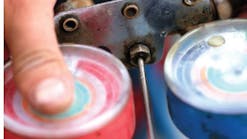Mitch Byrne, president, Northeast Cooling, Chicago, IL, is one of the hardest working men in the refrigeration service business. Follow him on twitter — @refrigeration — and you’ll find him announcing his next stop, or a recently completed job, whether it be the rooftop or mechanical room of a local restaurant, bar, warehouse, or convenience store.
He also works smart. So, in addition to being a non-stop service machine, Byrne has taken steps to communicate the value of planned maintenance to his many customers. Here’s how he suggests you try to explain planned maintenance to your customers.
____________
When it comes to repairs, try to get your customers to think of their commercial refrigerators much like they would think of their vehicles. The compressor in a cooler is like the car’s engine. If the compressor goes bad and is replaced, you get a new compressor, not a whole new cooler. The same way the garage doesn’t tell you to get a new car just because you need a bit of engine work. In other words, all the other components — including coils, fans, controls, piping, and gaskets (door seals) — are still old. This is similar to an engine in a car going bad and being replaced. You end up with a new engine in an old car.
There are a few key factors to consider when trying to help customers decide whether to replace the whole commercial cooler or just a part of it, when facing an expensive, major repair.
1. How old is the cooler? If it’s older than 10 years it’s advisable to price out a new one. At that age, it’s not likely to be very energy efficient, and it will have other parts in bad condition.
2. What kind of refrigerant is used in the cooler? If the answer is R12, R502, or R22, advise them to consider pricing out a new cooler, as R12 and R502 have been banned by the EPA for years, and R22 is currently being phased out by the EPA.
3. What is the overall condition of the cooler? Have them walk with you as you check door seals, hinges, the floor-in cooler, coils, and fans. If everything looks like it’s falling apart, it may be time to price out a new cooler.
It’s very possible those units may be wasting electricity (and money) by running in a weak condition, so customers will likely see refrigeration energy savings by purchasing a replacement.
If a commercial cooler is still fairly new, uses a refrigerant that isn’t on its way to being phased out, and is in overall good condition, the customer may come out ahead by just repairing the failed part.
Related Article: Serving Customer with Expertise In 'His Kind of Town'
Example of Planned Maintenance Benefits
The chart below compares the maintenance schedules of two bars located in the West Loop area in Chicago. Bar #1 has had a routine maintenance schedule and the equipment is serviced quarterly. Bar #2 has never accepted a maintenance quote, and never had all of its equipment cleaned and checked on a regular basis. They always call on the hottest days and and nights, getting whatever piece of equipment fixed that needs immediate attention.Bar #1 has more total equipment than Bar #2, but has less service calls for the year. Also, Bar #1 had only one compressor failure as compared to three at Bar #2. The overall cost of service for the year was much less for the client with a maintenance plan. The properly maintained equipment required far less electricity as well. Routine maintenance plans reduce service calls, save electricity and extend the life of refrigeration equipment.
When it comes to the reliability of equipment, preventive maintenance is a crucial factor. Failure to properly maintain commercial refrigeration will almost always lead to costly repairs and loss of product.
As Murphy’s Law would have it, these breakdowns usually occur at the most inopportune times, like nights and weekends. It’s at these times that cooler and freezer service comes at a premium. Failure to properly maintain equipment also causes much higher utility bills and shortens equipment life.
Problems caused by failure to maintain refrigeration equipment
- Increased utility bills
- Burnt wiring due to increased amp draw
- Fan motor failure caused by dirty coils
- Thermostat failure due to increased amp draw
- Compressor failure due to dirty coils
- Restriction of metering device caused by overheated and damaged refrigerant oil
Benefits of routine maintenance
- Reduced electrical consumption
- Reduced stress on equipment
- Less equipment breakdown
- Lower service and repair costs
- Longer equipment life
- Fresher product
- Reduced product spoilage
- Reduced chance of emergency service due to neglect










